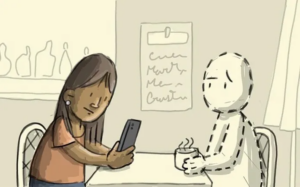Blogpost written by Hassan Faraj and Daniela Martinez Jimenez
Being ignored by one’s partner using their cell phone while in your company may have an influence in your daily perception of relationship satisfaction and personal outcomes.
Key points:
- The harmful combination of “phone” and “snubbing”.
- Effects in romantic relationships.
- “Getting even” partner response as a result.

Smartphones are useful, among a lot of other functionalities, to connect us with people beyond our immediate reach, fostering virtual connections. However, they have also emerged as a disruptive force in face-to-face interactions, particularly within romantic relationships in today’s digital era.
The phenomenon of phubbing, or phone snubbing, has captured the attention of academic researchers. This social problem has been previously associated with negative after-effects related to how the person perceives the current status of the relationship.
The research paper by Tessa Thejas Thomas, Katherine B. Carnelley, Claire M. Hart, published in Computers in Human Behavior adopted a daily diary approach in order to give insight to three specific concerns related to these everyday technology-driven interruptions of couple interaction, from the point of view of the Phubbee or recipient:
- What are the consequences of phubbing your partner in terms of their well-being and perception of relationships satisfaction?
- How do partners respond when they are phubbed?
- What are partner’s motives for choosing to pick their own phone and use it (retaliate) when they feel phubbed?
The last two were the primary focus of the study, given the fact that there is previous theoretical background related to the outcomes of partner phubbing but not so much in respects to retaliation and what incentives phubbees take into account for imitating their partner’s smartphone use.
So, how did they do it?
In the aim of addressing these concerns, a total of 75 participants recruited from social media, online forums, and word of mouth, were asked to complete a 10-day diary, where the first day involved demographic questions and the following 9 daily diaries measured factors related to the topic, with a “not at all” to “a great deal” scale generally.
And what did they find?
The study found that daily perceived partner phubbing decreases the relationship satisfaction. Simultaneously, participants also reported greater feelings of anger/frustration on days where the perception of Phubbing was high. However, the personal well-being, that was evaluated considering the self-esteem, depressive mood, and anxious mood, was not affected by the phubbing, which we found very surprising.
In respect of the different explored responses to partner phubbing, high level of phubbing was related to greater phubbee curiosity and resentment and not to conflict creation or ignoring the partners actions. Furthermore, as expected, partner phubbing was also associated with retaliation. It was found that individuals may retaliate by phubbing their partner back due to various motivations, including revenge, need for support, and need for approval.
It is time for reflection
The research paper sheds light on a common behavior and calls on individuals to be mindful and become more aware of their smartphone use during social interactions. Additionally, understanding the motivations behind retaliatory behaviors can help individuals recognize the negative consequences of phubbing and develop strategies to reduce its occurrence.
References:
Thomas, T. T., Carnelley, K. B., & Hart, C. M. (2022). Phubbing in romantic relationships and retaliation: A daily diary study. Computers in Human Behavior, 137, 107398. https://doi.org/10.1016/j.chb.2022.107398